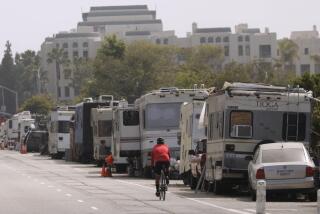Mobile Home Doors Open New Vistas for 4 Homeless Families
- Share via
Donna Samuels took one look inside her new home and started screaming and stamping her feet.
“It don’t believe it! I just don’t believe it!” she shouted. “It’s better than I ever expected it would be.”
Samuels, 32, and her four children were among four families that ceremoniously left the ranks of the homeless Thursday morning when they accepted keys from Los Angeles City Councilman Ernani Bernardi to four new, city-owned mobile homes at Pacoima’s San Fernando Gardens housing project.
The trailers are transitional residences where the homeless families can live for three to six months while they save the money to find a permanent place to live, said Leila Gonzalez-Correa, executive director of the Los Angeles Housing Authority.
Tenants must pay $100 a month to the housing authority.
‘Peace of Mind’
“Finally I can have peace of mind and get my life going again,” said Samuels, whose family was evicted from its rented home a month ago when the owner decided to sell it. Since then, she has lived with her children--ages 3, 5, 8 and 15--in a cramped motel room at the Valley Shelter in North Hollywood.
“I found a job, and now have a place to live--all in the same week,” she said. “This really is a new lease on life.”
Valley Shelter officials screened the homeless families who moved into the trailers and are screening other families who will live in four other two- and three-bedroom trailers at the Pacoima site. Four more families will be approved to move in within a week, officials said.
About 60 of 102 mobile homes bought by the city last summer will be located at low-income housing projects, officials said. The city is seeking private church and synagogue sites for the others, they said.
The Pacoima site was the second to receive trailers. Families have moved into 10 trailers at Ramona Gardens in East Los Angeles.
Families approved for the mobile homes are required to set up family budgets and savings accounts so that, in time, they will be able to afford conventional housing, Gonzalez-Correa said.
When the idea was first brought up, tenant groups feared the mobile homes would attract more crime and gang problems to already troubled areas. City officials have sought to allay those fears at public meetings.
In welcoming the four families Thursday, Bernardi said that all communities in the city should be willing to accept the trailers for the homeless.
“As you can see, these people could have been our next-door neighbors,” Bernardi said.
“They are good families who need a chance to get back on their feet.”
The trailers are simply furnished with a couch, kitchen table, beds, dressers and curtains. The walls are paneled.
After staying with her husband and child for a month at the Valley Shelter, Kathi Provau, 25, was delighted with the kitchen.
“It’s so big,” she said, laughing and opening cupboards. “I haven’t cooked on a stove in so long. And we have a refrigerator, too.
“When you’ve lived without a kitchen for so long, it’s hard to describe how good it feels to have one again,” she said.
“When they said trailer, I envisioned something on wheels, something kind of old,” said Cheryl Crutchfield, 23, who moved into a two-bedroom, two-bathroom mobile home with her 5-year old son.
“For 3 months, we’ve stayed in a small room,” she said. “This seems like a mansion.”
Thomas and Maria Olinger, who journeyed to Los Angeles from Chattanooga, Tenn., to find work, said they lived in “cheap, slum” motels, where they paid about $120 a week, until their money ran out. They then went to the Valley Shelter.
“Finally, we will have a chance to save money,” said Maria Olinger, adding that her husband recently found a construction job.
More to Read
Sign up for Essential California
The most important California stories and recommendations in your inbox every morning.
You may occasionally receive promotional content from the Los Angeles Times.












